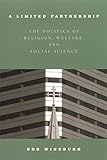A Limited Partnership : The Politics of Religion, Welfare, and Social Service / Bob Wineburg.
Material type: TextPublisher: New York, NY : Columbia University Press, [2001]Copyright date: ©2001Description: 1 online resource (320 p.)Content type:
TextPublisher: New York, NY : Columbia University Press, [2001]Copyright date: ©2001Description: 1 online resource (320 p.)Content type: - 9780231506649
- 361.7/5 21
- HV530 .W56 2001eb
- online - DeGruyter
| Item type | Current library | Call number | URL | Status | Notes | Barcode | |
|---|---|---|---|---|---|---|---|
 eBook
eBook
|
Biblioteca "Angelicum" Pont. Univ. S.Tommaso d'Aquino Nuvola online | online - DeGruyter (Browse shelf(Opens below)) | Online access | Not for loan (Accesso limitato) | Accesso per gli utenti autorizzati / Access for authorized users | (dgr)9780231506649 |
Frontmatter -- Contents -- Acknowledgments -- Introduction -- 1. Devolution or Devilution -- 2. A Blip in History or a Slip in the Academy? -- 3. Budget Cuts or Buttercups -- 4. If It Can’t Be Counted It Doesn’t Count -- 5. Is The Future Now? -- 6. The Future Ain’t What It Used To Be, Or Is It? -- 7. A Thought Experiment -- 8. Being Honest, Being Decent, Being Informed -- 9. Some Evolving Partnerships in a Changing Environment -- 10. Conclusion -- References -- Index
restricted access online access with authorization star
http://purl.org/coar/access_right/c_16ec
Ranging from the Reagan years to the present—a crucial period in both social welfare policy development and the history of religious involvement in social services—A Limited Partnership explores an important undercurrent in the new welfare policy. Robert Wineburg argues that the present policy, with its emphasis on services increasingly being delivered by the faith community, simply cannot work the way its architects envisioned. He calls for rationality in finding solutions to the complex problems of poverty and the division of responsibilities for helping those in need at the local level.Using almost twenty years of data from Greensboro, North Carolina, as a long-term case study, the author examines how the budget cuts of the Reagan era, the Bush era, and the Clinton era altered the relationships among religious congregations and other agencies. The book presents a vivid picture of the chaos caused by these policy changes at the level of service delivery and clearly demonstrates that the religious community cannot be the sole provider of social services but instead must remain an important but limited partner with a special role in delivering social services.Wineburg's study provides a fresh perspective on a policy debate that genuinely lacks understanding of how politics, religion, and a complicated web of social services operate at the community level.
Mode of access: Internet via World Wide Web.
In English.
Description based on online resource; title from PDF title page (publisher's Web site, viewed 02. Mrz 2022)


